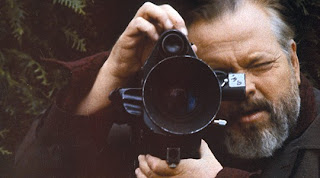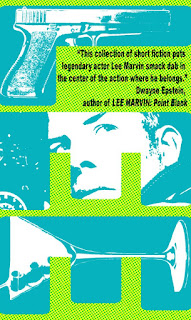I'm a fanatic about Orson Welles's 1962 THE TRIAL--a movie that I keep going back to year after year. While it has never gotten as much attention as some of his other films it is, for my money, one of The Great One's great achievements.
Welles had planned to make a documentary about the production--akin to the doc FILMING OTHELLO--and while it's a shame that he never got to complete the project, he did film a long Q&A at the University of Southern California following a viewing of the film.
The talk is marvelous stuff, with the big man holding forth on a variety of topics. He's as brilliant and slippery and maddening and wonderful as always.
You can watch the footage of his talk on Youtube thanks to "Citizen Welles". Check it out.
Sunday, March 31, 2013
Friday, March 22, 2013
NOIR CITY ANNUAL #5
The Best Of NOIR CITY Magazine 2012 is available now. It's another beauty--a lavishly illustrated collection of essays, interviews, profiles, reviews and more. Contributors include Eddie Muller, Imogen Sara Smith, Vince Keenan, Carl Steward and many, many more. All beautifully designed by the great Michael Kronenberg.
As usual I've made a few contributions. They include:
1. Women In Trouble: The Crisis Pregnancy in Film Noir
2. Children Of The Night: Noir and the Loss of Innocence
3. Tom Neal: The Broken Man
4. The Little Story of Right-Hand/Left-Hand: David Grubb, Charles Laughton, and THE NIGHT OF THE HUNTER
5. The Resurrection of NATIVE SON: An Interview with Edgardo Krebs
I'm proud of all of these essays--I think the Tom Neal piece might be the best piece of film writing I've done. So go get yourself a copy of this great book. I mean this when I say it: this is a must have for fans of film noir.
Added bonus: all proceeds go to the Film Noir Foundation and the rescue and restoration of classic noir movies.
Check it out here.
As usual I've made a few contributions. They include:
1. Women In Trouble: The Crisis Pregnancy in Film Noir
2. Children Of The Night: Noir and the Loss of Innocence
3. Tom Neal: The Broken Man
4. The Little Story of Right-Hand/Left-Hand: David Grubb, Charles Laughton, and THE NIGHT OF THE HUNTER
5. The Resurrection of NATIVE SON: An Interview with Edgardo Krebs
I'm proud of all of these essays--I think the Tom Neal piece might be the best piece of film writing I've done. So go get yourself a copy of this great book. I mean this when I say it: this is a must have for fans of film noir.
Added bonus: all proceeds go to the Film Noir Foundation and the rescue and restoration of classic noir movies.
Check it out here.
Felix E. Feist: The Factory Worker
I think I'm safe in saying that I'm the world's authority on the film noir career of Felix E. Feist. Frankly, I'm not really sure how this happened. Feist was a little known studio director in the classic era--one of many, many studio directors who never became a big name. Even a lot of noir geeks have never heard of him.
Quite by chance, though, I saw THE DEVIL THUMBS A RIDE around the time I made the conscious decision to start studying film noir as a form. It was good film with which to begin a serious interest in noir because it hits all the essential beats: it is dark, it is fast, and its message, ultimately, is the futility of human effort and intention.
Feist wrote and directed the film (adapted from the Robert Du Soe novel of the same name--not a particularly strong book, in my opinion). I tracked down more of his noir work: THE THREAT, THE MAN WHO CHEATED HIMSELF, TOMORROW IS ANOTHER DAY. What I found was the work of a director who was a wonderfully efficient craftsman.
A few years later I happened to attend a screening of one of his films and heard a well-known noir scholar refer to Feist as "pretty much just a hack" which struck me as an invitation to do something about a director that I really admired.
I've now written more about him than (I think) anyone else. I published a biographical overview of his life and work in the film journal NOIR CITY, and I wrote (I think) the first scholarly piece on his films for the book FILM NOIR: THE DIRECTORS.
Now I have a short introductory piece on his work over at Criminal Element. This will probably be my final word on ol' Felix. I hope it helps bring attention to his movies.
Quite by chance, though, I saw THE DEVIL THUMBS A RIDE around the time I made the conscious decision to start studying film noir as a form. It was good film with which to begin a serious interest in noir because it hits all the essential beats: it is dark, it is fast, and its message, ultimately, is the futility of human effort and intention.
Feist wrote and directed the film (adapted from the Robert Du Soe novel of the same name--not a particularly strong book, in my opinion). I tracked down more of his noir work: THE THREAT, THE MAN WHO CHEATED HIMSELF, TOMORROW IS ANOTHER DAY. What I found was the work of a director who was a wonderfully efficient craftsman.
A few years later I happened to attend a screening of one of his films and heard a well-known noir scholar refer to Feist as "pretty much just a hack" which struck me as an invitation to do something about a director that I really admired.
I've now written more about him than (I think) anyone else. I published a biographical overview of his life and work in the film journal NOIR CITY, and I wrote (I think) the first scholarly piece on his films for the book FILM NOIR: THE DIRECTORS.
Now I have a short introductory piece on his work over at Criminal Element. This will probably be my final word on ol' Felix. I hope it helps bring attention to his movies.
Friday, March 15, 2013
The Godmother of Noir: Elisabeth Sanxay Holding
To really understand the development of noir as a distinct literary form (distinct, I mean, from the whodunit or the procedural) you need to go back to the career of Elisabeth Sanxay Holding.
Along with folks like Cornell Woolrich and James M. Cain, Holding crafted tales of murder where the emphasis was on the perpetrators and the victims rather than on the heroic investigators. If most mystery fiction is about the reordering of chaos--setting right what has gone wrong, uncovering and punishing some aberrant evil--then Holding was far more interested in why people go wrong. Her characters are desperate or drunk or demented. Or all three.
In books like THE BLANK WALL, THE INNOCENT MRS. DUFF, NET OF COBWEBS, or THE GIRL WHO HAD TO DIE, Holding kept the emphasis on the dark interior lives of her characters. As much as someone like David Goodis, Holding traps us in the narrow, obsessive minds of her characters.
I have a new essay on Holding over at Criminal Element. Check it out and let me know what you think.
Along with folks like Cornell Woolrich and James M. Cain, Holding crafted tales of murder where the emphasis was on the perpetrators and the victims rather than on the heroic investigators. If most mystery fiction is about the reordering of chaos--setting right what has gone wrong, uncovering and punishing some aberrant evil--then Holding was far more interested in why people go wrong. Her characters are desperate or drunk or demented. Or all three.
In books like THE BLANK WALL, THE INNOCENT MRS. DUFF, NET OF COBWEBS, or THE GIRL WHO HAD TO DIE, Holding kept the emphasis on the dark interior lives of her characters. As much as someone like David Goodis, Holding traps us in the narrow, obsessive minds of her characters.
I have a new essay on Holding over at Criminal Element. Check it out and let me know what you think.
Sunday, March 3, 2013
"I bet you're a big Lee Marvin fan..."
I'm pleased as all hell to have a story in LEE, the new short story collection from those degenerates at The Crime Factory. The collection features sixteen tales of the great wild man of American cinema, Lee Marvin.
Remember I'M NOT THERE, the surreal Bob Dylan biopic from Todd Haynes? LEE is like the pulp version of that but with someone more interesting than Bob Dylan. (Yeah, I said that. Who would you rather get drunk with? Exactly. Lee Marvin was a war hero, he did movies with everyone from Ronnie Reagan to Jane Fonda, and he consumed more booze than Ireland. Lee Marvin was, in a word, fun.)
The collection has a fine roster of talent including Scott Phillips (and who's better than Scott f-ing Phillips?), Eric Beetner, Heath Lowrance, Johnny Shaw, Jenna Bass, Adrian McKinty, Ray Banks, Nigel Bird, James Hopwood, Erik Lundy, Luke Preston, Ryan K. Lindsey, Andrew Nette, Cameron Ashley, and Jimmy Callaway.
Check out LEE.
Remember I'M NOT THERE, the surreal Bob Dylan biopic from Todd Haynes? LEE is like the pulp version of that but with someone more interesting than Bob Dylan. (Yeah, I said that. Who would you rather get drunk with? Exactly. Lee Marvin was a war hero, he did movies with everyone from Ronnie Reagan to Jane Fonda, and he consumed more booze than Ireland. Lee Marvin was, in a word, fun.)
The collection has a fine roster of talent including Scott Phillips (and who's better than Scott f-ing Phillips?), Eric Beetner, Heath Lowrance, Johnny Shaw, Jenna Bass, Adrian McKinty, Ray Banks, Nigel Bird, James Hopwood, Erik Lundy, Luke Preston, Ryan K. Lindsey, Andrew Nette, Cameron Ashley, and Jimmy Callaway.
Check out LEE.
Subscribe to:
Comments (Atom)




